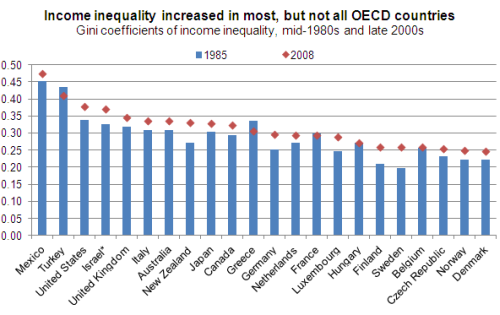Society: Governments must tackle record gap between rich and poor, says OECD
05/11/2911 - The gap between rich and poor in OECD countries has reached its highest level for over over 30 years, and governments must act quickly to tackle inequality, according to a new OECD report.
â
Divided We Stand: Why Inequality Keeps Risingâ finds that the average income of the richest 10% is now about nine times that of the poorest 10 % across the OECD.
The income gap has risen even in traditionally egalitarian countries, such as Germany, Denmark and Sweden, from 5 to 1 in the 1980s to 6 to 1 today. The gap is 10 to 1 in Italy, Japan, Korea and the United Kingdom, and higher still, at 14 to 1 in Israel, Turkey and the United States.
In Chile and Mexico, the incomes of the richest are still more than 25 times those of the poorest, the highest in the OECD, but have finally started dropping.
Income inequality is much higher in some major emerging economies outside the OECD area. At 50 to 1, Brazil's income gap remains much higher than in many other countries, although it has been falling significantly over the past decade.

Launching the report in Paris, OECD Secretary-General Angel GurrÃ*a said
âThe social contract is starting to unravel in many countries. This study dispels the assumptions that the benefits of economic growth will automatically trickle down to the disadvantaged and that greater inequality fosters greater social mobility. Without a comprehensive strategy for inclusive growth, inequality will continue to rise.â
The main driver behind rising income gaps has been
greater inequality in wages and salaries, as the high-skilled have benefitted more from technological progress than the low-skilled. Reforms to boost competition and to make labour markets more adaptable, for example by promoting part-time work or more flexible hours, have promoted productivity and brought more people into work, especially women and low-paid workers. But
the rise in part-time and low-paid work also extended the wage gap.
Tax and benefit systems play a major role in reducing market-driven inequality, but have become less effective at redistributing income since the mid-1990s. The main reason lies on the benefits side: benefits levels fell in nearly all OECD countries, eligibility rules were tightened to contain spending on social protection, and transfers to the poorest failed to keep pace with earnings growth.
As a result, the benefit system in most countries has become less effective in reducing inequalities over the past 15 years.
Another factor has been a cut in top tax rates for high-earners.
âThere is nothing inevitable about high and growing inequalities,â said Mr GurrÃ*a. âOur report clearly indicates that upskilling of the workforce is by far the most powerful instrument to counter rising income inequality. The investment in people must begin in early childhood and be followed through into formal education and work.â
The OECD underlines the need for governments to review their tax systems to ensure that wealthier individuals contribute their fair share of the tax burden. This can be achieved by raising marginal tax rates on the rich but also improving tax compliance, eliminating tax deductions, and reassessing the role of taxes in all forms of property and wealth, the report says.





 Reply With Quote
Reply With Quote






